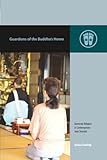Guardians of the Buddha's Home : Domestic Religion in Contemporary Jōdo Shinshū / Jessica Starling; ed. by Mark Michael Rowe.
Material type: TextPublisher: Honolulu : University of Hawaii Press, [2019]Copyright date: ©2019Description: 1 online resource (200 p.) : 7 b&w illustrationsContent type:
TextPublisher: Honolulu : University of Hawaii Press, [2019]Copyright date: ©2019Description: 1 online resource (200 p.) : 7 b&w illustrationsContent type: - 9780824866921
- 9780824866952
- online - DeGruyter
- Issued also in print.
| Item type | Current library | Call number | URL | Status | Notes | Barcode | |
|---|---|---|---|---|---|---|---|
 eBook
eBook
|
Biblioteca "Angelicum" Pont. Univ. S.Tommaso d'Aquino Nuvola online | online - DeGruyter (Browse shelf(Opens below)) | Online access | Not for loan (Accesso limitato) | Accesso per gli utenti autorizzati / Access for authorized users | (dgr)9780824866952 |
Frontmatter -- Contents -- Series Editor's Preface -- Acknowledgments -- Introduction -- 1. A Family of Clerics -- 2. Staying at Home as Buddhist Propagation -- 3. Home Economics -- 4. Social Networks and Social Obligations in the Disciplining of Bōmori -- 5. Wives in Front of the Altar -- 6. Equality and Freedom in the Ōtani-ha -- Conclusion -- Glossary -- Notes -- Works Cited -- Index -- About the Author
restricted access online access with authorization star
http://purl.org/coar/access_right/c_16ec
In Guardians of the Buddha's Home, Jessica Starling draws on nearly three years of ethnographic research to provide a comprehensive view of Jōdo Shinshū (True Pure Land) temple life with temple wives (known as bōmori, or temple guardians) at its center. Throughout, she focuses on "domestic religion," a mode of doing religion centering on more informal religious expression that has received scant attention in the scholarly literature.The Buddhist temple wife's movement back and forth between the main hall and the "back stage" of the kitchen and family residence highlights the way religious meaning cannot be confined to canonical texts or to the area of the temple prescribed for formal worship. Starling argues that attaining Buddhist faith (shinjin) is just as likely to occur in response to a simple act of hospitality, a sense of community experienced at an informal temple gathering, or an aesthetic affinity with the temple space that has been carefully maintained by the bōmori as it is from hearing the words of a Pure Land sutra intoned by a professional priest. For temple wives, the spiritual practice of button hōsha (repayment of the debt owed to the Buddha for one's salvation) finds expression through the conscientious stewardship of temple donations, caring for the Buddha's home and opening it to lay followers, raising the temple's children, and propagating the teachings in the domestic sphere. Engaging with what religious scholars have called the "turn to affect," Starling's work investigates in personal detail how religious dispositions are formed in individual practitioners. The answer, not surprisingly, has as much to do with intimate relationships and "idian practices as with formal liturgies or scripted sermons.
Issued also in print.
Mode of access: Internet via World Wide Web.
In English.
Description based on online resource; title from PDF title page (publisher's Web site, viewed 02. Mrz 2022)


